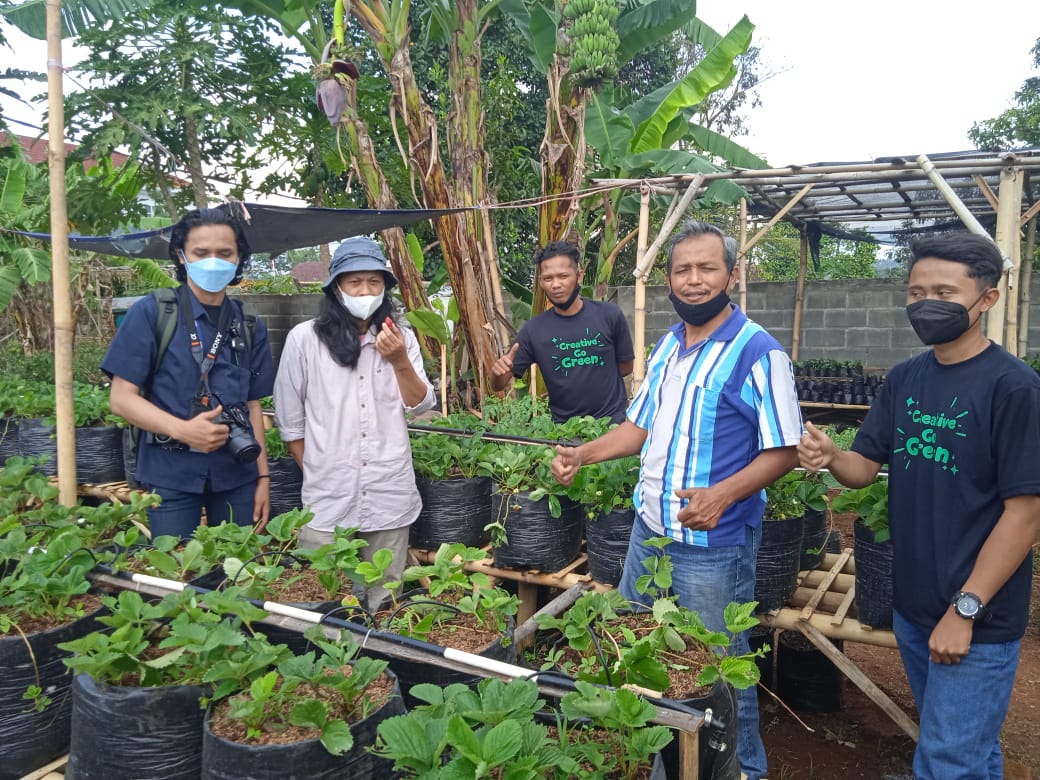Garut - PT Jamkrindo Collaborates with Salarea Foundation to Empower Rural Communities through Seedling House Initiative
In response to the ongoing COVID-19 pandemic, PT Jamkrindo, in collaboration with the Salarea Foundation, has focused on improving food security for rural communities by addressing the need for high-quality seedlings in Cibatu, Garut, West Java. This initiative aims to empower local communities and promote sustainable agriculture, with particular attention to environmental conservation and supporting local economies.
The Salarea Foundation has initiated the development of a seedling house in Cibatu, Garut, designed to nurture various plants, including strawberries, coffee, and conservation plants such as coconut trees and bamboo. This initiative will also support the rehabilitation of critical river basin areas (DAS) in the region. Some areas in Garut are currently at risk of flooding, while others, especially in the northern parts of Garut, frequently face clean water crises during the dry season.
The Seedling House project is a part of PT Jamkrindo's broader commitment to sustainable development goals (SDGs), with a focus on creating shared value (CSV). According to Putrama Wahju Setyawan, President Director of PT Jamkrindo, this program aims to create employment opportunities, stimulate economic growth, and support environmental conservation through community empowerment efforts in Garut.
"We continue to support community empowerment efforts, economic strengthening, and environmental preservation programs. Our initiative in Garut is a part of Jamkrindo's creating shared value (CSV) program, which aligns with our commitment to the SDGs," said Putrama in a statement.
In addition to the seedling house, PT Jamkrindo and Salarea Foundation are also working on strengthening coffee farmers' capacity through training, establishing coffee demonstration plots (demplots), and providing equipment to support the Pawon Kopi Salarea coffee initiative. This initiative aims to improve the quality and branding of Kopi Dukuh Sadakeling.
On the environmental side, Jamkrindo has supported the establishment of plastic waste shredding machines and the development of waste banks to help manage plastic waste through community-based initiatives.
During the visit, Jamkrindo's team had the opportunity to observe the activities of Masyarakat Peduli Lingkungan (MPL) volunteers and waste banks in various areas, including Loji, Pasir Waru, and Kampung Warung, where they work on collecting, sorting, and processing plastic waste, producing paving blocks and crafts from plastic waste, and learning to create planting media for strawberry cultivation.
Dadan M. Ramdan, Founder of the Salarea Foundation, shared that one of the key members of the MPL community, Krisuwanto Basuki (Pak Kris), will be training others in the community to cultivate strawberries. The seedling house will initially focus on growing strawberries. Kris, who has experience in strawberry cultivation, is keen to teach local residents how to grow strawberries independently using pots or polybags.
Pak Kris hopes that the residents of Loji will be able to plant strawberries in their yards, adding greenery to the environment. "I want to make the Loji area greener with strawberries. After testing it out, I found that it grows well in Cibatu," he said.
Asep, Deputy Head of SMA PGRI Cibatu, also expressed appreciation for the creation of the waste bank and the upcoming seedling house in the school area. He sees this as an excellent collaboration between the private sector, environmental organizations, local communities, and the school in promoting empowerment and environmental care. The seedling house and waste bank will even become part of the school's extracurricular activities.
Dadan also emphasized that the seedling house will play an important role in coffee seedling production since many farmers in the region are in need of quality coffee seedlings to increase their productivity. The house will also serve as a production site for conservation plants such as coconut and bamboo, which are essential for the rehabilitation of river basin areas (DAS), and for producing organic compost with the help of the MPL volunteers.
"Coconut and bamboo are chosen for conservation because they are not only valuable economically but also have strong roots that help prevent erosion. We hope that the seedling house can generate income for MPL volunteers and waste bank members, and we welcome support from various stakeholders, both private and governmental, to help develop this initiative," Dadan added.
However, there are challenges such as capital and the availability of quality seedlings. Local farmers are often unable to access high-quality seeds. "We would be grateful if there are parties that can help provide superior seedlings, especially coffee, so that the productivity of our harvests can improve," said Wawan, a farmer from Kampung Dukuh, Desa Karyamukti, Cibatu.
Regarding the development of the waste bank, Rismanto, the manager of the Salarea Waste Bank, mentioned that they still need facilitation for waste bank management training and capacity building. "We are currently processing 50 kilograms of waste per day. We hope that the waste bank can help solve the problem of illegal waste disposal and bring benefits to the community, inspiring other environmental care initiatives," Rismanto said.
Mulyana, the manager of the MPL Pasir Waru Waste Bank, called on other private companies to support community groups involved in empowerment and assistance, particularly in rural and marginalized areas. "The contribution of private companies and BUMNs is crucial to advancing the village economy. We hope that Jamkrindo's sustainable empowerment initiatives in Garut can be followed by other companies," he concluded.
This initiative by PT Jamkrindo and the Salarea Foundation highlights the company's continued commitment to sustainable development, community empowerment, and environmental preservation, while supporting rural economies in Garut.



